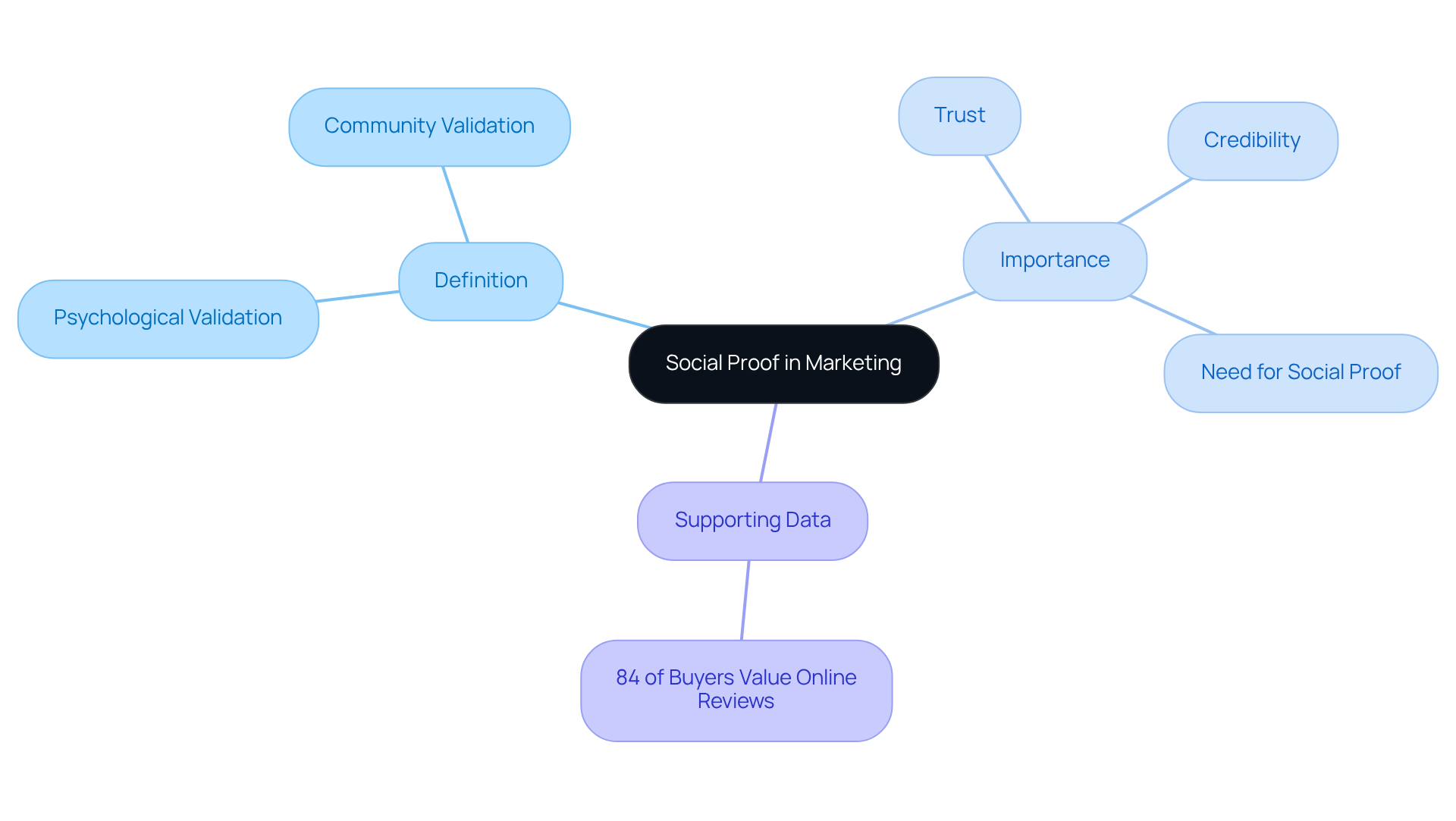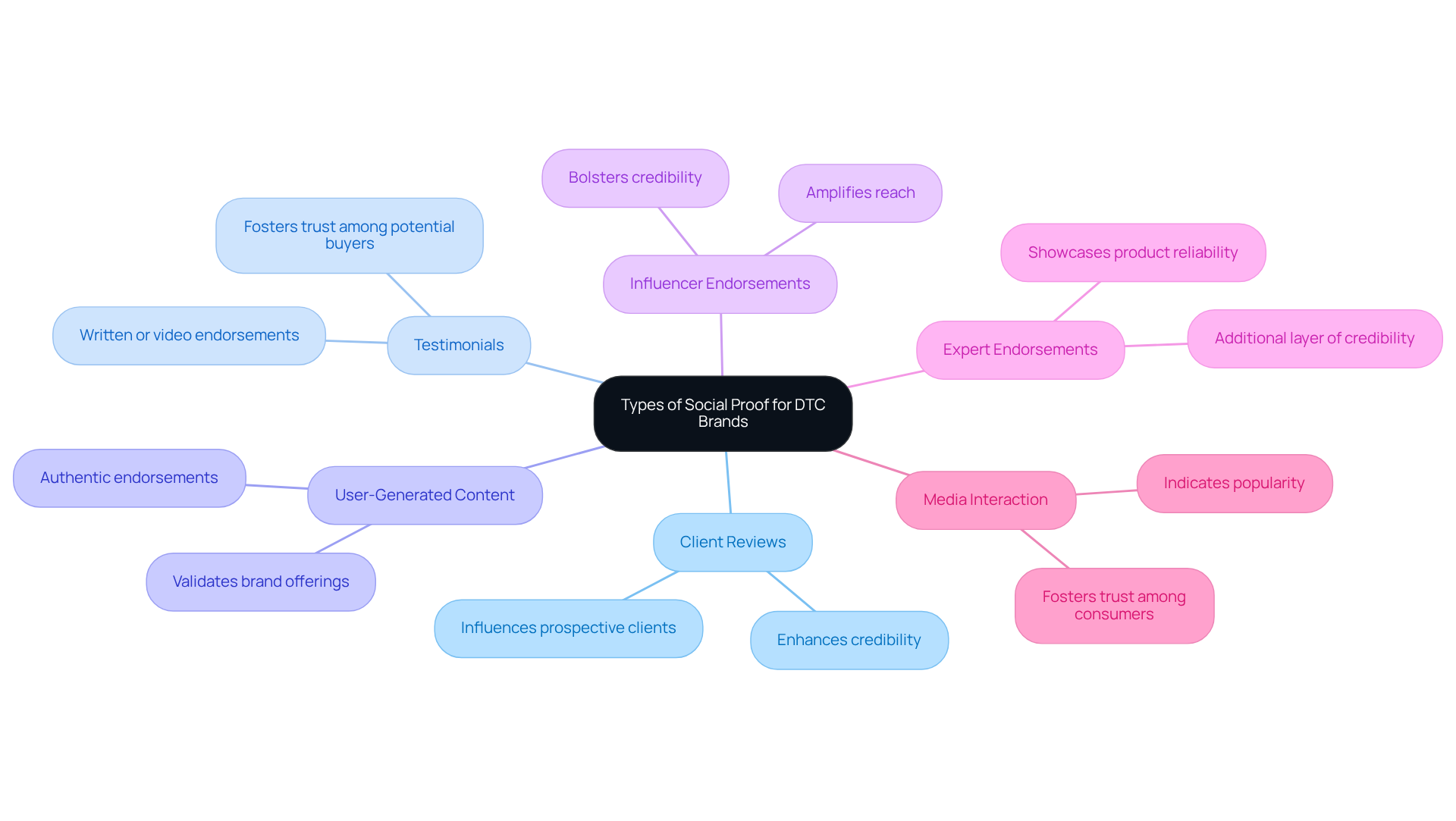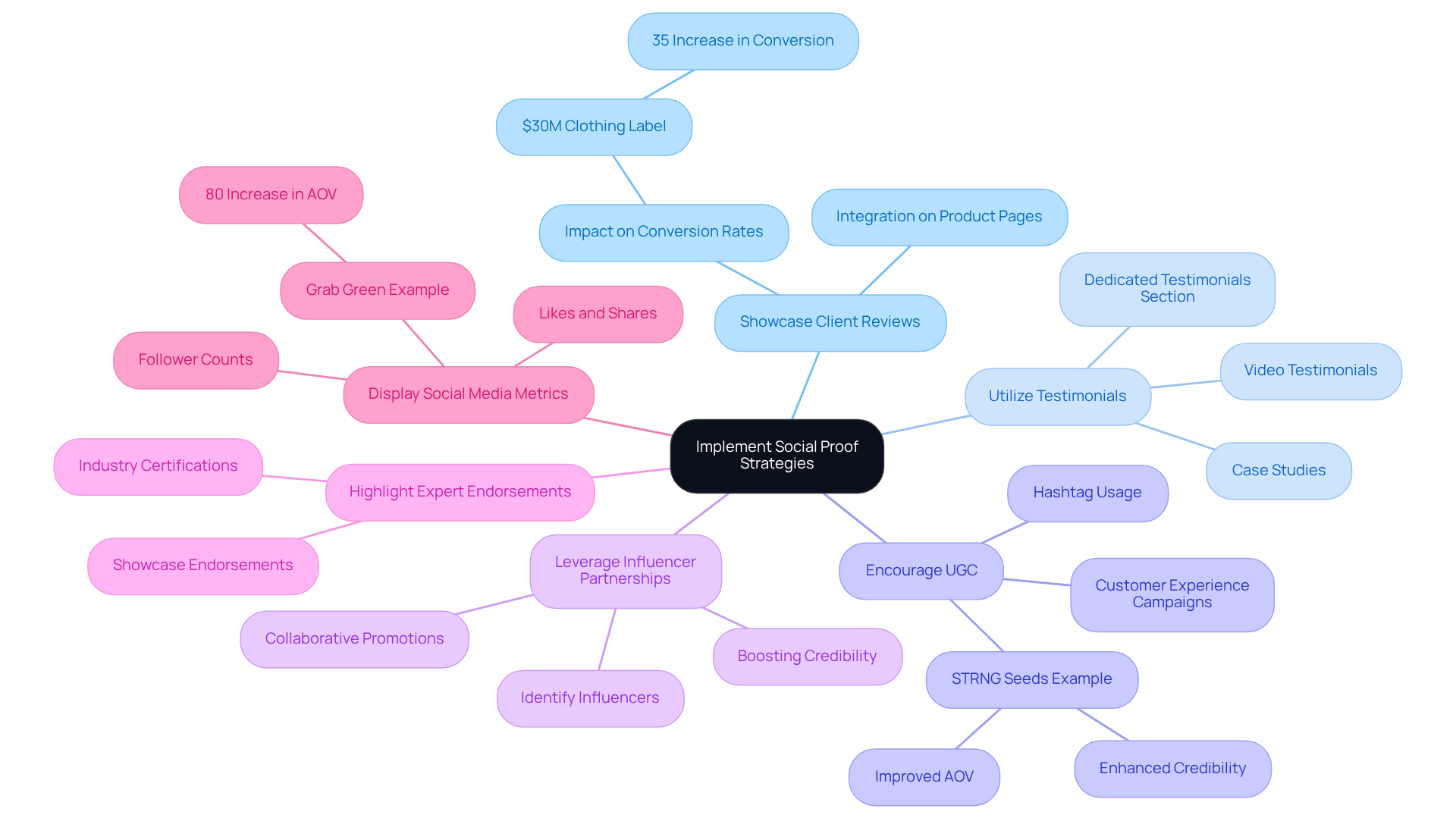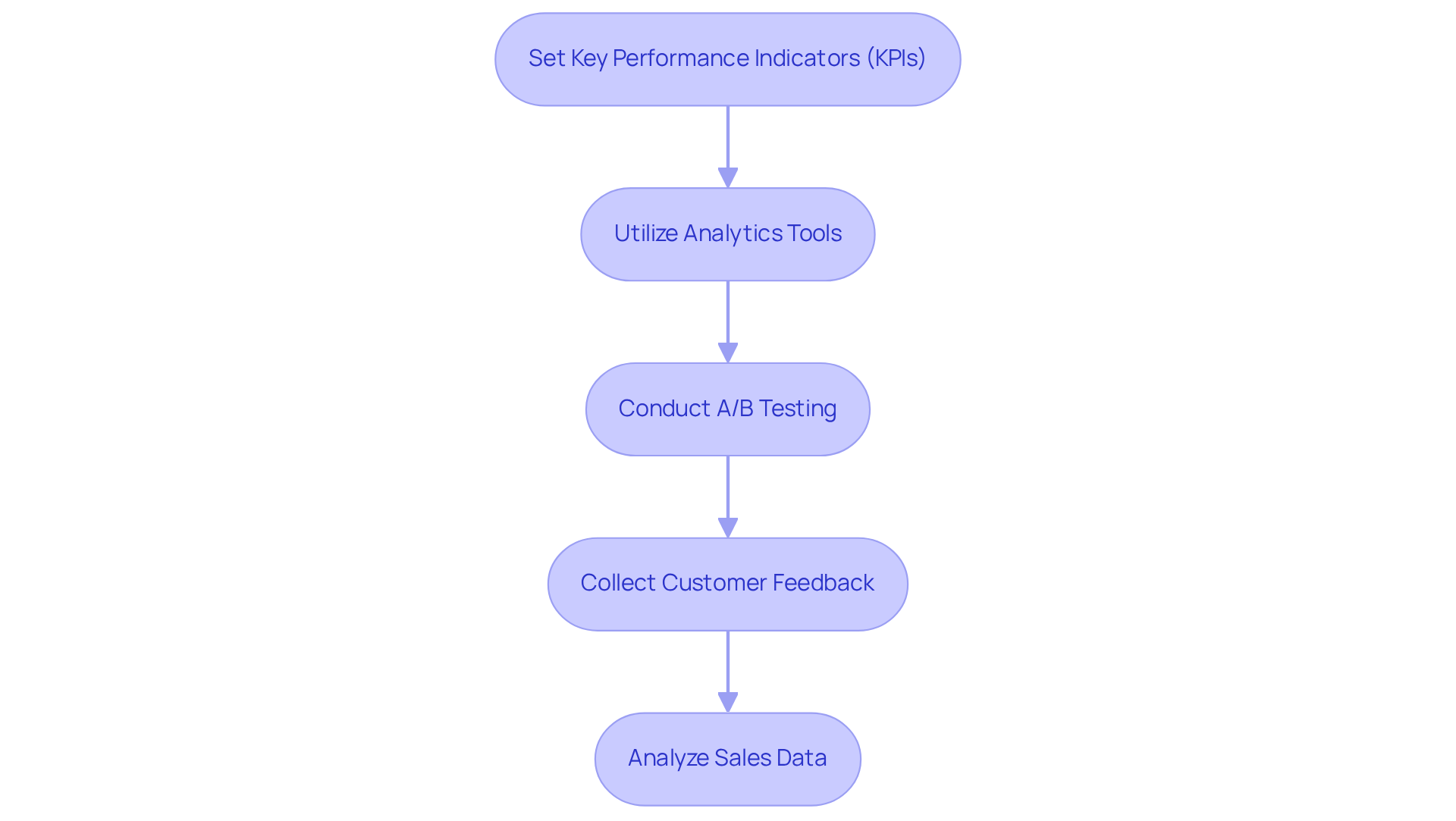
Overview
Social proof stands as a cornerstone in the marketing strategies of direct-to-consumer (DTC) brands, fostering trust and credibility through the experiences and opinions of previous customers. By leveraging this powerful tool, brands can significantly enhance their market presence. Strategies such as:
- Showcasing client reviews
- Utilizing testimonials
- Encouraging user-generated content
are not merely optional; they are essential for increasing conversion rates and cultivating customer loyalty.
In a competitive marketplace, these tactics position brands for success. Data consistently shows that consumers are more likely to engage with brands that demonstrate social proof. For instance, a study revealed that 79% of consumers trust online reviews as much as personal recommendations. This statistic underscores the necessity of integrating social proof into marketing efforts.
To drive action, brands must actively implement these strategies. Encouraging satisfied customers to share their experiences and showcasing these testimonials prominently can create a compelling narrative that resonates with potential buyers. By doing so, DTC brands not only enhance their credibility but also establish a loyal customer base that advocates for their products.
In conclusion, the effective use of social proof is integral to the marketing success of DTC brands. By focusing on customer experiences and leveraging their voices, brands can build a trustworthy image that attracts and retains customers in an increasingly competitive landscape.
Introduction
The influence of social proof in marketing is undeniable, shaping consumer behavior in ways that can make or break a brand's success.
As direct-to-consumer (DTC) companies navigate an increasingly competitive landscape, understanding the significance of community validation becomes paramount.
This article delves into the various forms of social proof available to DTC brands and outlines effective strategies for harnessing this powerful tool.
How can brands ensure they are leveraging social proof effectively to not only attract but also retain customers in a world where trust is fleeting?
Define Social Proof and Its Importance in Marketing
Social validation is a powerful psychological phenomenon where individuals seek the actions and opinions of others to guide their own behavior. In the realm of marketing, social proof in marketing refers to consumers relying heavily on the experiences of previous customers to inform their purchasing decisions. For direct-to-consumer companies, community validation is not just beneficial; it is essential. It fosters trust and credibility—two crucial elements in a competitive marketplace.
Consider the data: studies show that 84% of buyers regard online reviews similarly to personal endorsements. This statistic underscores the significance of community validation as a vital trust indicator. When consumers see that others have had positive experiences, their confidence in a brand increases dramatically. By effectively leveraging social proof in marketing, companies can significantly enhance their conversion rates and cultivate lasting consumer loyalty.
In conclusion, the strategic use of social proof in marketing is not merely an option; it is a necessity for businesses aiming to thrive in today's market. Companies that embrace this approach position themselves for success, gaining the trust of their customers and ultimately driving sales.

Explore Different Types of Social Proof Relevant to DTC Brands
DTC brands can leverage several types of social proof to enhance their marketing strategies:
-
Client Reviews: Positive feedback from past purchasers significantly influences prospective clients. By prominently displaying these reviews on product pages, brands can enhance their credibility.
-
Testimonials: Written or video endorsements from satisfied clients serve as compelling evidence of a product's value, fostering trust among potential buyers.
-
User-Generated Content (UGC): Encouraging clients to share their experiences on social media platforms creates authentic endorsements, further validating the brand's offerings.
-
Influencer Endorsements: Collaborating with influencers who resonate with your target audience can amplify your company's reach and bolster its credibility in the market.
-
Expert Endorsements: Securing endorsements from industry experts provides an additional layer of credibility, showcasing the product's reliability and quality.
-
Media Interaction: High engagement levels on media platforms serve as societal validation, indicating popularity and fostering trust among consumers.
By understanding and implementing these forms of validation, DTC brands can effectively enhance their marketing strategies and connect more deeply with their audience.

Implement Social Proof Strategies in Your Marketing Campaigns
To effectively implement social proof in your marketing campaigns, consider the following strategies:
-
Showcase Client Reviews: Integrate client testimonials on product pages and landing pages. Use star ratings and highlight positive comments to attract attention. For instance, a $30M clothing label experienced a 35% rise in conversion rates after revamping their homepage to prominently showcase testimonials and user feedback.
-
Utilize Testimonials: Create a dedicated testimonials section on your website. Video testimonials can be particularly persuasive. This method has demonstrated success in numerous case studies, where brands have leveraged social proof in marketing to achieve substantial increases in trust and engagement from clients.
-
Encourage UGC: Run campaigns that motivate customers to share their experiences on social media using a specific hashtag. Feature this content on your website and social channels. Brands like STRNG Seeds have successfully leveraged user-generated content to enhance their credibility and improve average order values (AOV).
-
Leverage Influencer Partnerships: Identify influencers in your niche and collaborate with them to promote your products. Their endorsement can significantly boost your company's credibility by leveraging social proof in marketing. This strategy has been instrumental for companies seeking to expand their reach and build trust.
-
Highlight Expert Endorsements: If applicable, showcase endorsements from industry experts or certifications that your product has received. This can further validate your offerings and attract selective clients.
-
Display Social Media Metrics: Share follower counts, likes, and shares on your website to demonstrate popularity. For example, displaying evidence metrics can assist companies like Grab Green, which increased their AOV by 80% through strategic improvements, to establish trust with prospective customers.
By incorporating these strategies, DTC brands can effectively leverage testimonials as social proof in marketing to enhance their efforts and drive conversions, as demonstrated by the successful outcomes achieved by Parah Group's clients.

Measure and Analyze the Effectiveness of Social Proof
To effectively measure and analyze the impact of social proof in your marketing campaigns, consider the following steps:
-
Set Key Performance Indicators (KPIs): Clearly define what success looks like for your credibility initiatives. Common KPIs include conversion rates, engagement metrics, and client feedback scores, providing a quantitative basis for evaluation.
-
Utilize Analytics Tools: Implement analytics platforms such as Google Analytics to track user behavior on your website. This enables observation of how community validation elements, such as customer feedback and real-time alerts, relate to conversion rates and overall engagement.
-
Conduct A/B Testing: Execute A/B tests to evaluate the performance of web pages incorporating trust elements compared to those lacking them. This approach assists in measuring the direct effect of societal validation on conversion rates, offering practical insights for enhancement.
-
Collect Customer Feedback: Frequently request input from clients about their views on validation elements. This qualitative information uncovers insights into how community validation affects their buying choices and overall confidence in your company.
-
Analyze Sales Data: Examine correlations between community validation initiatives and sales performance. Identifying which strategies yield the highest returns can guide future marketing efforts and resource allocation.
By systematically measuring and analyzing social proof in marketing, DTC brands can refine their marketing strategies, enhancing effectiveness and driving greater customer engagement.

Conclusion
The strategic implementation of social proof in marketing is not merely an enhancement; it is a critical component for direct-to-consumer brands striving to excel in a competitive landscape. Understanding the psychological impact of social validation enables brands to build trust and credibility—essential elements for fostering customer loyalty and driving sales.
This article explored various forms of social proof, including:
- Client reviews
- Testimonials
- User-generated content
- Influencer endorsements
- Expert endorsements
- Media interactions
Each type serves as a powerful tool to bolster a brand's credibility and influence consumer behavior. Furthermore, actionable strategies for integrating these elements into marketing campaigns were discussed, such as showcasing client reviews and leveraging influencer partnerships, which have proven to significantly increase conversion rates and engagement.
In a marketplace where consumer trust is paramount, leveraging social proof is vital. Brands that effectively utilize these strategies not only enhance their marketing efforts but also position themselves for sustainable success. Embracing social proof invites brands to deepen connections with customers and foster a community of loyal advocates. Therefore, it is essential for DTC brands to prioritize social proof in their marketing strategies to achieve long-term growth and success.
Frequently Asked Questions
What is social proof in marketing?
Social proof in marketing refers to the phenomenon where consumers rely on the experiences and opinions of previous customers to inform their purchasing decisions.
Why is social proof important for direct-to-consumer companies?
Social proof is essential for direct-to-consumer companies as it fosters trust and credibility, which are crucial elements in a competitive marketplace.
How do consumers view online reviews in relation to personal endorsements?
Studies show that 84% of buyers regard online reviews similarly to personal endorsements, highlighting the importance of community validation as a trust indicator.
What impact does social proof have on consumer confidence?
When consumers see that others have had positive experiences with a brand, their confidence in that brand increases dramatically.
How can companies benefit from leveraging social proof in their marketing strategies?
By effectively leveraging social proof, companies can significantly enhance their conversion rates and cultivate lasting consumer loyalty.
Is the use of social proof in marketing optional for businesses?
No, the strategic use of social proof in marketing is a necessity for businesses aiming to thrive in today's market.
FAQs











